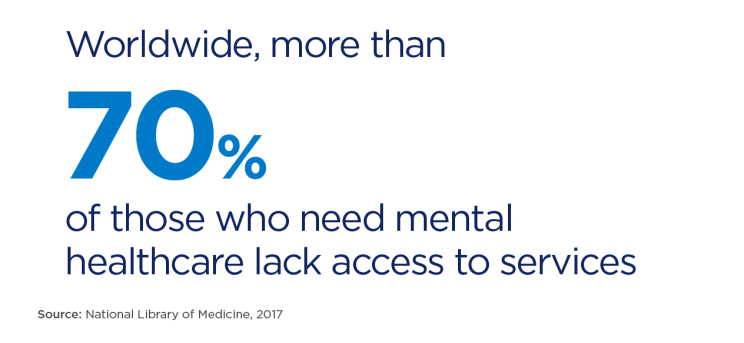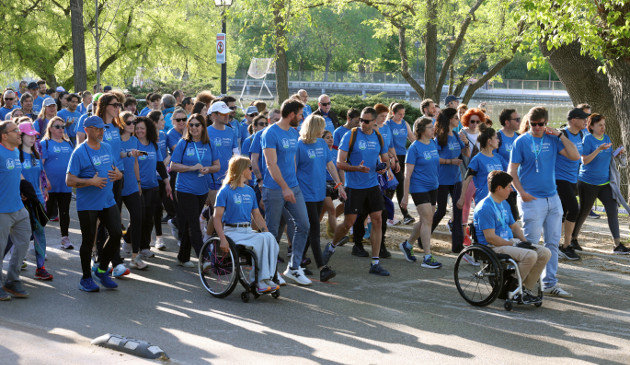Mental healthcare is at a critical crossroads. Today, an estimated one in eight people around the world live with a mental health condition. Yet support and treatment options remain limited – especially in underserved or remote communities. Worldwide, more than 70% of those who need care lack access to services.
Taking care of our mind is crucial to our overall health and wellbeing. If left unaddressed, mental health challenges can increasingly drive poor physical health, workplace absence and pressure on health systems. About 12 billion working days are lost every year to depression and anxiety.
Despite growing awareness, the way we deliver mental healthcare hasn’t kept pace with how people live, feel and work in the modern world. Most approaches are reactive, waiting until someone is in crisis before offering help. But mental health is continuous and dynamic – influenced by every part of our daily lives, including stress, sleep, relationships and environment.
We need a system that reflects this reality – one that’s holistic, proactive and integrated into modern lives.

Holistic: making the mind-body connection
Studies from the World Health Organization (WHO) show that mental and physical health are deeply interconnected. The WHO’s most recent guidance presses for urgent reform globally in mental health provision – including holistic and preventative approaches.
Poor mental health can increase the risk of chronic diseases such as heart disease, diabetes, and stroke. Studies have also linked disturbed sleep and chronic stress to heightened risks of cognitive decline, including dementia and Alzheimer’s. Addressing mental health holistically is essential to building healthier communities.
Just as we regularly invest in our physical health through nutrition and exercise, we need to care for our mental wellbeing every day, not just in moments of crisis.
Proactive: focusing on prevention over cure
Waiting until symptoms escalate isn’t just costly – but it is often associated with a long process of returning to a balanced mental health.
A more preventative approach to mental health can help people access support earlier, improving outcomes and reducing pressure on care systems. This proactive strategy can be delivered by a combination of in-person care and digital solutions.
Walk-in mental health clinics, counselling sessions and structured therapy programmes such as Cognitive Behavioural Therapy (CBT) can all help people address challenges early.
Encouraging a culture of openness – where people can talk about stress, anxiety, and mental load – can reduce isolation and prompt earlier action. A recent study shows that just one quality conversation a day with a friend can significantly boost mental health.
Digital tools are also helping to make mental health support more accessible and stigma-free. For example, Blua, digital health by Bupa, gives users quick access to clinicians and psychologists – integrating mental health into everyday healthcare.
Integrated: meeting people where they are
Digital solutions, supported by AI, are enabling personalised care that fits into our lives.
Digital wellbeing apps can track changes in mood and behaviour patterns – offering nudges or flagging signs that more support may be needed. And wearable devices can now monitor heart rate variability, sleep patterns and physical activity – all valuable indicators of mental health. These insights can help clinicians intervene earlier and tailor care more effectively.
AI is also increasingly being used to identify early signs of anxiety and depression through speech analysis, facial recognition, and journaling patterns, enabling timely nudges or referrals.
When integrated into daily life, these digital solutions can help paint a fuller picture of a person’s wellbeing. And by combining these innovations with in-person human care, we can create services that respond to how people actually live and feel.
The opportunity for healthcare leaders
Mental health affects everything – our ability to work, to care for others and to enjoy life. And it affects everyone, whether directly or indirectly. To truly support wellbeing, mental health must be a core part of mainstream healthcare, not siloed as a separate concern. Achieving this will take investment, innovation and empathy.
We have an opportunity to rethink what mental healthcare looks like – and to build care systems that are truly resilient. That means prioritising prevention and early support, expanding access to physical and digital solutions, creating a culture where it’s safe to talk about mental health and recognising mental health as a core part of whole health.
At Bupa, we’re committed to being part of that shift. With Mindplaces – our new dedicated spaces offering expert face-to-face support – our Harmonia clinics in Poland, alongside Blua and continued investment in integrated models of care, we aim to support mental wellbeing at every life stage and help build healthier futures for all.




